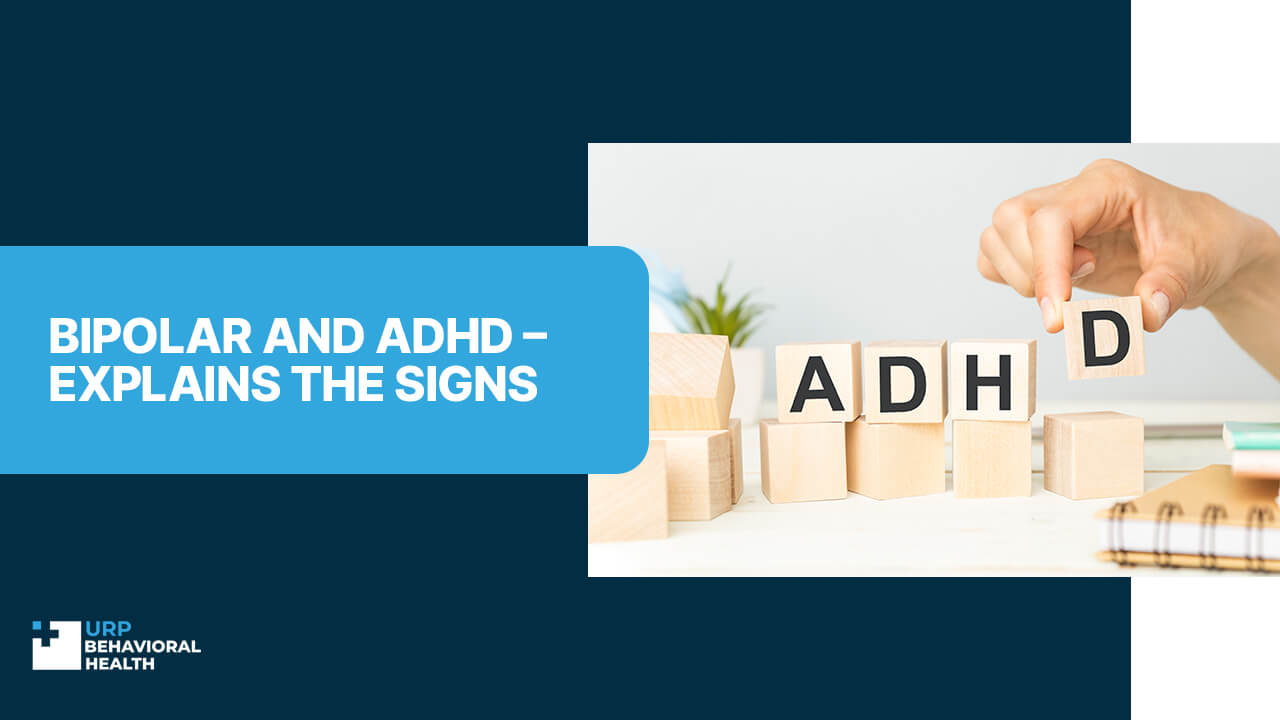
Bipolar and ADHD – Explains The Signs
Accurate diagnosis and treatment of ADHD may necessitate recognizing the correlation between the two conditions and the onset of bipolar disorder. The impact of both conditions can be life-changing, and it is common to confuse the two conditions due to symptoms that overlap, making it challenging to distinguish between them. ADHD and bipolar disorder are often confusedly identified between the two conditions that are common in those with more severe symptoms, but this article offers a thorough analysis to help you understand the distinction.
ADHD and bipolar disorder: The clinical features, signs, characteristics, variations, and therapies.
What is ADHD?
Neurodevelopmental disorders, including ADHD or bipolar, are caused by the characteristic properties of inattention, hyperactivity, and impulsivity. The symptoms can differ significantly and may impact daily activities and development, potentially causing disturbances. Childhood is the initial indication of ADHD, but its symptoms can persist into adulthood, impacting one’s academic performance, work, and social interactions. ADHD is attributed to a combination of genetic, environmental, and neurological factors, which may include ADHD in debating and hyperactivity in adults. [1].
Don’t wait - confidential help is available right now for you or your loved one.
What is Bipolar Disorder?
Bipolar disorder is a condition that results in emotional retardancies that range from intense emotions (mania or hypomania) to intense and lasting changes (depression), making it an unwell mental illness. Mood episodes, which can last for extended periods of time, can cause significant changes in an individual’s psychological state. Depending on the severity and nature of the mood episodes, as well as the presence or absence of mood depressive episodes, and mood episode classifications, Bipolar disorder can be classified into various categories, such as Bipolar I, Bipolar II, and Cyclothymic Disorder. Bipolar disorder is a complex condition that impacts multiple sclerosis and other organelles through a combination of genetic, biochemical, and environmental factors, regardless of the disorder’s underlying cause. [2].
Symptoms of ADHD VS Bipolar Disorder
ADHD and bipolar disorder can be confusingly similar, as the condition often confuses distinguishing between the two conditions. However, there are key differences:
ADHD Symptoms:
- Inattention: Easy distraction, impulsive behavior, careless erroneous ideas, challenging to keep concentration, cluttered presence, easy fatigue.
- Hyperactivity: Obsolete behavior such as walking, sitting, talking excessively, running or climbing in inappropriate situations, and restlessness.
- Impulsivity: Interfering with others, having a hard time getting someone to take a specific time, thinking about things long without having consequences, making swift decisions without considering the consequences. [3].
Bipolar Disorder Symptoms:
● Manic Episodes:
- Elevated mood: Feeling overly happy or euphoric.
- Increased energy: Low reluctance to sleep, hyper.
- Risky behavior: Gender issues, inadequacy, bad taste, skepticism, or sexual behavior.
- Rapid speech: Talking quickly, jumping from one topic to another.
● Depressive Episodes:
- Low mood: Persistent sadness, hopelessness.
- Fatigue: Feeling depleted and tired, experiencing a loss of energy.
- Changes in sleep: Insomnia or sleeping too much.
- Changes in appetite: Significant weight loss or gain.
- Suicidal thoughts: Grievances such as suicide or self-inflicted harm. [4].
Difference Between ADHD and Bipolar Disorder
ADHD and bipolar disorder share some impulsivity and mood swings, but they differ in one of the primary ways depression and hyperactivity in the individual:
- Onset and Duration: Bipolar disorder is typically associated with bipolar disorder during late adolescence or early adulthood, while ADHD symptoms typically appear in early childhood. Bipolar disorder is a disorder that is episodic, with bipolar disorder affecting episodic episodes, while chronic ADHD affects individuals individually and is often a disorder.
- Mood Episodes: Bipolar disorder is marked by specific mood phases (such as mania, hypomania, and depression), whereas ADHD is distinguished by a prolonged state of inattention and hyperactivity/impulsivity.
- Energy Levels: Bipolar individuals may experience erections with increased energy during manic episodes, while those with ADHD are hyperactive without the extreme energy levels associated with bipolar mania.
- Sleep Patterns: Bipolar disorder often includes significant changes in sleep patterns during mood episodes, while ADHD does not inherently involve such dramatic sleep disturbances [5].
We’ll help you understand your options and guide you toward care.
Double Diagnoses
ADHD and bipolar disorder can be diagnosed alongside the comorbidity condition comorbidity, which is particularly severe in some individuals. The clinical picture of the disorder can be impacted by the interaction between symptoms deteriorating due to the development of various disorders, which can impact the quality of the clinical picture. Impulsive personality disorder and depression and bipolar disorder can be inherited from individuals with impulsive personality disorder, just as it can be caused by the latter in individuals with depression and bipolar disorder. Adequate treatments for ADHD and bipolar disorder require diagnostic criteria, resulting in varying approaches to treating both disorders. Treatment strategies that include both types of comorbidity should consider both factors when addressing each disorder separately, as comorbidity can negatively impact prognosis.
Diagnosing ADHD and Bipolar Disorder
ADHD and bipolar disorder are distinguished by their classification, as both conditions require customary medical treatment, leaving only the diagnoses associated with ADHD and the affliction. Patients may be subjected to misdiagnosis when the diagnosis they receive is not necessarily correct, resulting in missed diagnoses and unsuitable treatment that may not be based on their symptoms. [7]. Diagnostic testing can involve questionnaires, behavior rating scales, and observation in different settings to guarantee a thorough assessment.
Treating ADHD and Bipolar Disorder
Multifactorial therapy for ADHD and bipolar disorder offers an integrated approach that addresses both conditions. This article discusses non-pharmacological interventions, but it also takes into account medication. The subsequent phase, which requires prior consulting with a doctor, is critical for providing you with the knowledge and guidance you require for a highly tailored treatment plan.
Psychotherapy
Cognitive-behavioral therapy (CBT) is a form of cognitive-behavioral therapy that can treat ADHD and a possible bipolar disorder in conjunction with helpful management. Psychotherapy with emphasis on learning coping mechanisms, improved organizational patterns, and increased social interaction is among the most successful ways to manage mental health issues and mood swings, according to CBT. IPSRT can enhance daily routines and enhance interpersonal relationships for individuals with bipolar disorder, which can help alleviate the effects of mood episodes and bring about change. [8]. The use of family therapy can be an essential aspect of healthcare as it helps to incorporate family experiences into therapy, improve communication and support structures, and offer education and support for struggling families.
Psychoeducation
It is crucial to educate individuals and their families about ADHD and bipolar disorder by educating them and their families. Identifying the specific conditions associated with each can aid in reducing stigma, enhancing treatment acceptance, and supporting communication between patients and their care team. Counseling and education regarding the symptoms and origins of ADHD and bipolar disorder, stress management techniques, and the importance of consistent treatment recommendations are often part of psychoeducation programs. Programs like these can help patients and their families become more involved in managing their condition by developing an active involvement in managing their condition.
Lifestyle Modifications
Lifestyle changes may assist individuals with ADHD and bipolar disorder in coping with their conditions, particularly those with ADHD. Balanced sleep patterns, physical effort, and nutritious food can stabilize mood and enhance focus and focus. Meditation and yoga are more closely linked to mindfulness practices than meditation, but meditation and yoga primarily helps with relaxation and stress management. Consciousness should be exercised when engaging in stimulant and alcohol consumption, as these substances can have detrimental effects on mental health like anxiety, depression, and aggression. By staying completely clean of stimulants and alcohol and avoiding them, you can reduce your blood sugar and other emotional indicators, as they can negatively impact your wellbeing. Establishing a systematic routine can aid in managing symptoms and introducing more permanent changes to daily life, helping individuals to develop routines and lifestyles.
Support Systems
Developing a strong support network for individuals with ADHD and bipolar disorder is crucial. Family, friends, support groups, and mental health professionals may all be included. People with caring and supportive families can rely on emotional support, practical assistance, and support to fully implement their treatment plans, as well as emotional and practical support. Sharing your personal stories and situations with others can also be helpful in adjusting and learning new skills. Support groups can serve as a means of venturing beyond the visual and emotional aspects of ADHD and bipolar disorder while meeting with individuals who share similar struggles.
Conclusion
Linking ADHD to bipolar disorder is crucial for inventing and treating treatment if ADHD is diagnosed. These conditions are frequently co-occurring and can intensify each other’s symptoms, emphasizing the necessity of comprehensive treatment plans. Those with bipolar disorder and ADHD should consider seeking professional help if they or someone else in your life is dealing with it. Individuals with managing these conditions can dramatically improve their quality of life by working closely with healthcare professionals to determine accurate diagnoses and effective treatment plans.
Reach out today and let us create a treatment plan designed around your needs.
Sources
- National Institute of Mental Health (NIMH). (2024). “Bipolar Disorder.” https://www.nimh.nih.gov/health/topics/bipolar-disorder
- American Psychiatric Association. (2024). “What Is Bipolar Disorder?” https://www.psychiatry.org/patients-families/bipolar-disorders/what-are-bipolar-disorders
- National Alliance on Mental Illness (NAMI). “ADHD.” https://www.nami.org/About-Mental-Illness/Mental-Health-Conditions/ADHD
- National Alliance on Mental Illness (NAMI). (2017). “Bipolar Disorder.” https://www.nami.org/About-Mental-Illness/Mental-Health-Conditions/Bipolar-Disorder
- Cerullo, M. A., & Strakowski, S. M. (2007). “The prevalence and significance of substance use disorders in bipolar type I and II disorder.” https://pubmed.ncbi.nlm.nih.gov/17908301/
- Bauer, M., & Whybrow, P. C. (2001). “Thyroid hormone, neural tissue, and mood modulation.” https://pubmed.ncbi.nlm.nih.gov/12587187/
- American Psychiatric Association. (2013). “Diagnostic and Statistical Manual of Mental Disorders (DSM-5).”
- Miklowitz, D. J. (2002). “The Bipolar Disorder Survival Guide: What You and Your Family Need to Know.”
- Colom, F., & Vieta, E. (2006). “Psychoeducation Manual for Bipolar Disorder.”
















